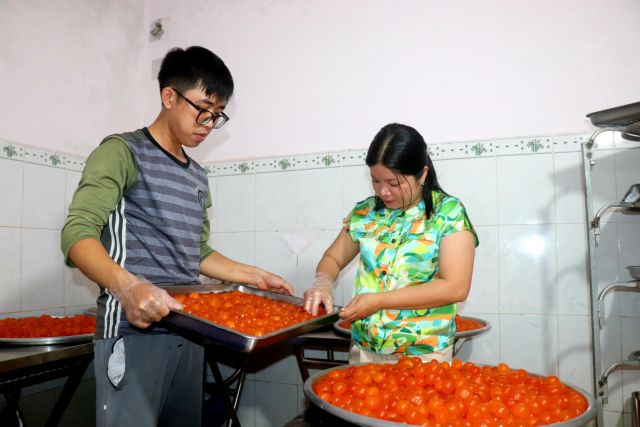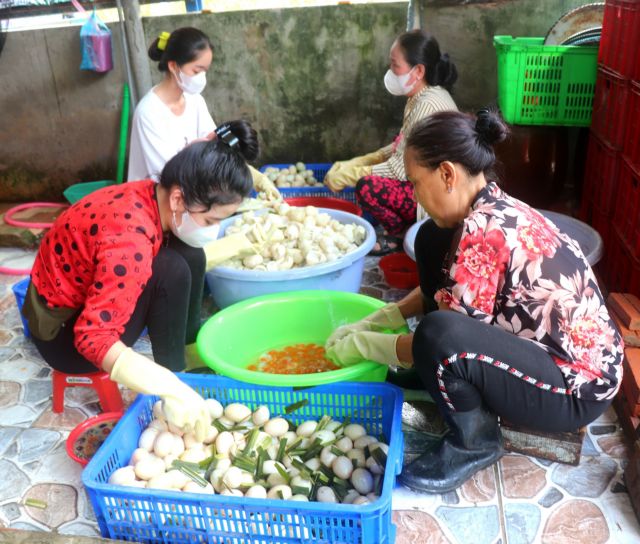 Society
Society


|
| Lê Thị Thanh Tuyền sorts salted duck eggs' yolks at her production facility in Thới Lai District in the Mekong Delta City of Cần Thơ.—VNA/VNS Photo Thu Hiền |
CẦN THƠ — Lê Thị Thanh Tuyền found a lifeline for her family's finances in salted duck eggs after nearly two years in the business.
After the COVID-19 pandemic, many families faced economic hardship, including Tuyền’s family.
At that time, a friend suggested Tuyền learn to make salted duck eggs to open a shop selling porridge with eggs - a popular dish in the Mekong Delta.
She began experimenting with salted duck eggs for her family and relatives.
After a successful first batch, she decided to take a risk and focus on selling salted duck eggs instead of opening a porridge shop.
She started to produce 300 salted duck eggs for selling online, however sales were slow.
Tuyền, from Trường Thọ Hamlet, Trường Xuân B Commune, Thới Lai District in the Mekong Delta City of Cần Thơ, then came up with the idea of separating the salted egg yolks to supply to bakeries.
She meticulously separated the salted egg yolks, cleaned and dried them, then vacuum-sealed and froze them for delivery to bakeries that used the salted egg yolks ingredients.
“Persistence was key,” Tuyền said. “I had to visit countless businesses and follow up for six months before I secured orders.”
Satisfied clients, impressed by the quality and reliability of Tuyền's product, referred her to others.
Currently, Tuyền’s customers span not just Cần Thơ but various provinces in the Delta.
A unique flavour
Tuyền said the key to retaining customers was ensuring cleanliness, quality and a distinctive flavour.
Her salted duck eggs and salted egg yolks were registered and certified for food safety.
L.T.H.V. from Ninh Kiều District, a frequent user of salted duck eggs in her family's meals, said that she identified a different flavour between normal salted duck eggs and those made by Tuyền.
Tuyền said while many in the Delta traditionally use ash to salt the duck eggs, she did not, she developed her own method.
After purchasing duck eggs, they were cleaned and then soaked in a brine solution, to which she added familiar herbs to reduce the fishy smell and enhance aroma.
The duck eggs were soaked for approximately 20-22 days.
After 22 days, they would be cleaned, quality-checked and wrapped in sterile paper before being sealed in vacuum bags and placed in trays.
The salted duck eggs are then packaged in trays (four, six, or ten eggs per tray) for sale to porridge shops and retail outlets.
Tuyền said the sterile paper helped retain moisture, allowing the salted duck eggs to stay fresh for about two months in the fridge and up to six months in the freezer.
At room temperature, they lasted about 10-15 days.
The salted duck eggs were sold retail at VNĐ6,500 ($0.25) and wholesale at VNĐ5,000 ($0.19).

|
| Local workers at Tuyền's production facility in Thới Lai District in the Mekong Delta City of Cần Thơ.—VNA/VNS Photo Thu Hiền |
Expanding production
Although not the first to mass-produce salted duck eggs in the city, Tuyền’s distinctive flavour and consistent quality have allowed her to supply around 10,000 to 20,000 salted duck eggs daily.
However, the salted duck eggs are less in demand compared to salted duck eggs’ yolks.
As a result, Tuyền decided to focus on increasing production of the salted yolks.
About 50 salted yolks are vacuum-sealed in bags for better preservation and easier distribution, with prices ranging from VNĐ3,000-3,500 ($0.11-0.13) each, depending on size.
Tuyền's production facility now has 150 brine tanks, along with pressing and vacuum-sealing equipment.
Each month, she uses ten tonnes of salt to process between 300,000 and 400,000 duck eggs.
From May to July, during the mid-autumn festival season when bakeries ramp up production, Tuyền's output triples compared to normal months.
Initially struggling to sell just 1,000 salted duck eggs a month, Tuyền's business has now reached the scale of selling over a million salted eggs in the peak months.
To meet the demand, her facility employs ten workers, each working eight-hour daily shifts.
Lê Thị Hoa, head of the Economic-Social Board and Farmers’ Support Fund under the Cần Thơ Farmers’ Association, said that Tuyền was dedicated to her business.
She had not only created employment for herself and boosted her family’s income, but also provided job opportunities for local workers, including many women, with earnings ranging from VNĐ3.5 ($139) to VNĐ5.5 million ($219) per month, depending on their roles.
Tuyền said she planned to expand her sales beyond traditional wholesale channels by increasing her presence on social media and aimed to scale up her operations to supply around 700,000 to 800,000 salted duck eggs monthly. — VNS




